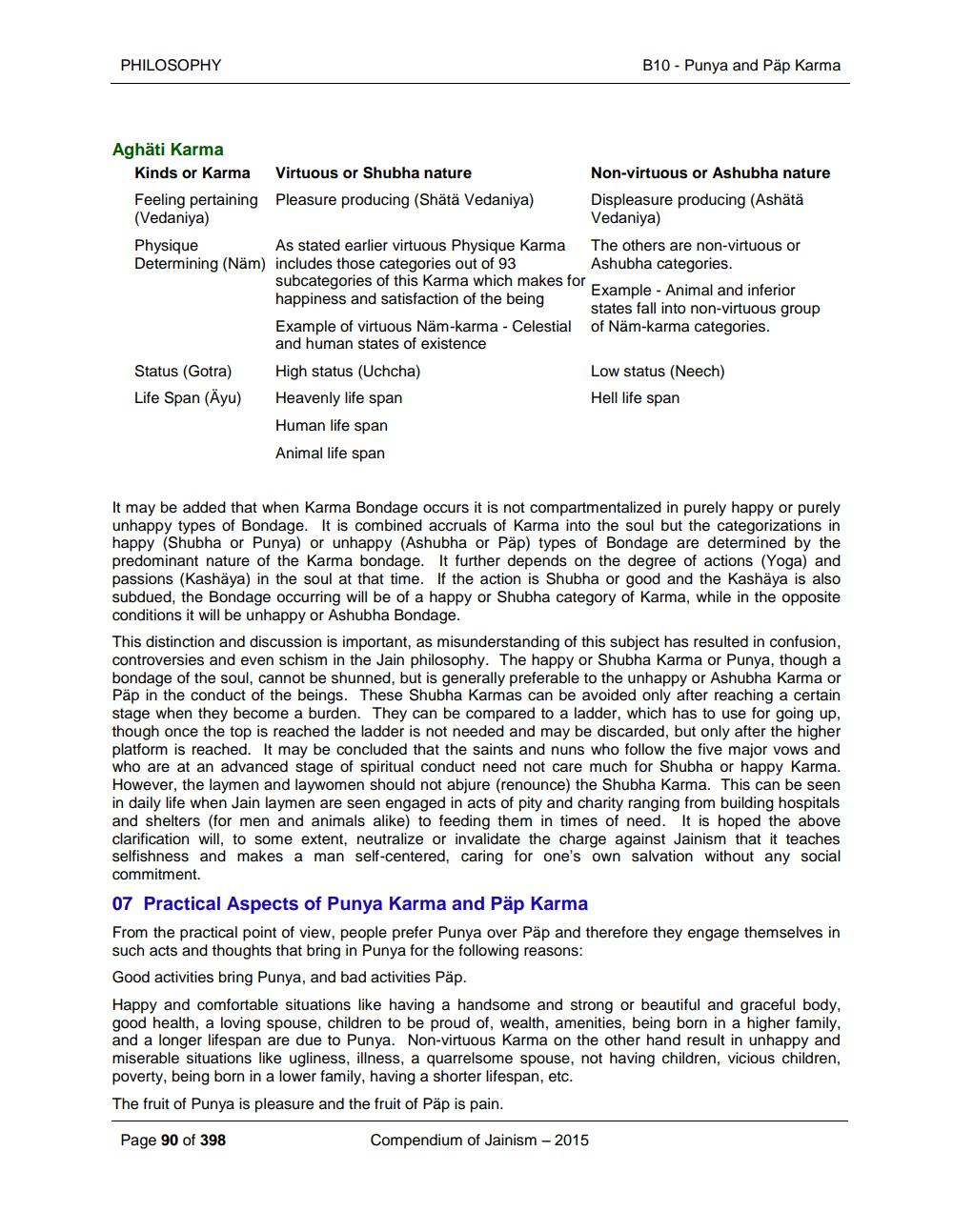________________
PHILOSOPHY
B10 - Punya and Pap Karma
Aghäti Karma Kinds or Karma Virtuous or Shubha nature
Non-virtuous or Ashubha nature Feeling pertaining Pleasure producing (Shätä Vedaniya) Displeasure producing (Ashätä (Vedaniya)
Vedaniya) Physique
As stated earlier virtuous Physique Karma The others are non-virtuous or Determining (Näm) includes those categories out of 93
Ashubha categories. subcategories of this Karma which makes for
"Example - Animal and inferior happiness and satisfaction of the being
states fall into non-virtuous group Example of virtuous Näm-karma - Celestial of Näm-karma categories.
and human states of existence Status (Gotra) High status (Uchcha)
Low status (Neech) Life Span (Äyu) Heavenly life span
Hell life span Human life span Animal life span
It may be added that when Karma Bondage occurs it is not compartmentalized in purely happy or purely unhappy types of Bondage. It is combined accruals of Karma into the soul but the categorizations in happy (Shubha or Punya) or unhappy (Ashubha or Päp) types of Bondage are determined by the predominant nature of the Karma bondage. It further depends on the degree of actions (Yoga) and passions (Kashaya) in the soul at that time. If the action is Shubha or good and the Kashaya is also subdued, the Bondage occurring will be of a happy or Shubha category of Karma, while in the opposite conditions it will be unhappy or Ashubha Bondage. This distinction and discussion is important, as misunderstanding of this subject has resulted in confusion, controversies and even schism in the Jain philosophy. The happy or Shubha Karma or Punya, though a bondage of the soul, cannot be shunned, but is generally preferable to the unhappy or Ashubha Karma or Päp in the conduct of the beings. These Shubha Karmas can be avoided only after reaching a certain stage when they become a burden. They can be compared to a ladder, which has to use for going up, though once the top is reached the ladder is not needed and may be discarded, but only after the higher platform is reached. It may be concluded that the saints and nuns who follow the five major vows and who are at an advanced stage of spiritual conduct need not care much for Shubha or happy Karma. However, the laymen and laywomen should not abjure (renounce) the Shubha Karma. This can be seen in daily life when Jain laymen are seen engaged in acts of pity and charity ranging from building hospitals and shelters (for men and animals alike) to feeding them in times of need. It is hoped the above clarification will, to some extent, neutralize or invalidate the charge against Jainism that it teaches selfishness and makes a man self-centered, caring for one's own salvation without any social commitment. 07 Practical Aspects of Punya Karma and Pap Karma From the practical point of view, people prefer Punya over Päp and therefore they engage themselves in such acts and thoughts that bring in Punya for the following reasons: Good activities bring Punya, and bad activities Päp. Happy and comfortable situations like having a handsome and strong or beautiful and graceful body, good health, a loving spouse, children to be proud of, wealth, amenities, being born in a higher family, and a longer lifespan are due to Punya. Non-virtuous Karma on the other hand result in unhappy and miserable situations like ugliness, illness, a quarrelsome spouse, not having children, vicious children, poverty, being born in a lower family, having a shorter lifespan, etc.
The fruit of Punya is pleasure and the fruit of Päp is pain.
Page 90 of 398
Compendium of Jainism - 2015




